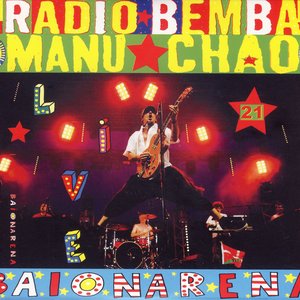Manu Chao, born José-Manuel Thomas Arthur Chao on June 21, 1961, in Paris, … Read Full Bio ↴Manu Chao, born José-Manuel Thomas Arthur Chao on June 21, 1961, in Paris, France, is a multifaceted musician celebrated for his eclectic musical style and socially conscious lyrics. Chao's musical journey began in the vibrant Parisian music scene, where he immersed himself in diverse influences ranging from punk and rock to reggae and salsa. Co-founding the band Mano Negra in 1987, Chao showcased his knack for blending genres, resulting in international acclaim with albums like "Patchanka" (1988) and "Casa Babylon" (1994). Following the dissolution of Mano Negra in 1995, Chao embarked on a prolific solo career, marked by albums such as "Clandestino" (1998) and "Próxima Estación: Esperanza" (2001), where he continued to push musical boundaries while addressing social and political issues. Incorporating elements of street music and bar scenes from various cultures, Chao formed Radio Bemba Sound System, collaborating with musicians from Mexico, Brazil, and Argentina to create a vibrant fusion of sounds. His innovative use of technology, including recording exclusively on a laptop, reflects his commitment to artistic experimentation. Through his music, Chao has championed themes of cultural diversity, social justice, and global solidarity, earning him a revered status as a visionary musician and cultural ambassador.
Full Wikipedia article: https://en.wikipedia.org/wiki/Manu_Chao
Discography
Clandestino (1998)
Próxima Estación: Esperanza (2001)
Radio Bemba Sound System (2002)
Sibérie m'était contéee (2004)
La Radiolina (2007)
Baionarena (2008)
Full Wikipedia article: https://en.wikipedia.org/wiki/Manu_Chao
Discography
Clandestino (1998)
Próxima Estación: Esperanza (2001)
Radio Bemba Sound System (2002)
Sibérie m'était contéee (2004)
La Radiolina (2007)
Baionarena (2008)
More Genres
No Artists Found
More Artists
Load All
No Albums Found
More Albums
Load All
No Tracks Found
Genre not found
Artist not found
Album not found
Search results not found
Song not found
Baionarena
Manu Chao Lyrics
A Cosa Che cosa? Che cosa? Che cosa vuoi da me? Che cosa vuoi anco…
Bienvenida a Tijuana Bienvenida a Tijuana Bienvenida, mi amor De noche a la mañan…
Casa Babylon Entre casa y Babylon Camino peleon Entre tu mama y Babylon…
Clandestino Solo voy con mi pena Sola va mi condena Correr es mi…
Crèv' La Vie Donne-moi de quoi tenir-tenir Je ne veux pas dormir-dormir L…
Desaparecido Me llaman el desaparecido Que cuando llega ya se ha ido Vola…
El Hoyo De la mera mata Yo vengo del hoyo Tepito fayuca…
El Viento El viento viene, el viento se va Por la frontera El…
L'hiver Est Là Les feuilles sont jaunes Les hommes sont verts La tente est …
La Primavera (Esperanza) ¿qué horas son mi corazón? ¿Qué horas son mi cor…
La Vacaloca Pa'l cementerio se va La vaca de mala leche Pa'l cementerio …
La Vida Tombola Si yo fuera Maradona viviría como él Si yo fuera Maradona…
Machine Gun Si la tierra tiembla Si la tierra tiembla Se hunde en el…
Mala Vida ...Pase lo que pase... ...Sea lo que sea... Tu me estàs dan…
Mr Bobby (This world go crazy) (This world go crazy) (This world go c…
Panik, Panik Ça va pour vous? Que passo yaa? La Mano Negra On y va C'est…
Peligro Cuidado en el barrio Cuidado por la cena Cuidado donde es…
Radio Bemba Que horas son en Inglaterra Que horas son en Gibraltar Que…
Rainin' in Paradize Welcome to paradise Welcome to paradise Today it’s rainin To…
Rumba De Barcelona Rumba Rambla pa'quí Rambla pa'llá Esa la Rumba de Barcelon…
The Monkey now three little monkeys sat on a coconut tree discussing th…
Tristeza Maleza El nada en el mar Ella nada en el mar Todo nada…
Tumba Canto mi canto antiguo Ya pa poe Tumba la corebamba mi negra…

Anne Melchior
on Clandestino
<3 <3 <3